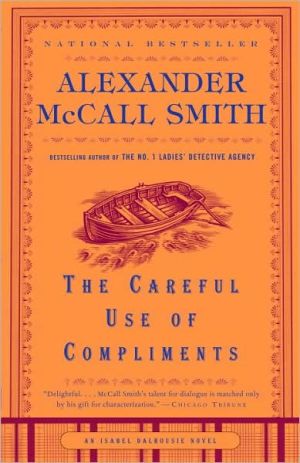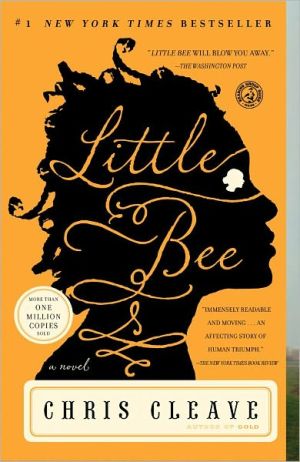The Careful Use of Compliments (Isabel Dalhousie Series #4)
ISABEL DALHOUSIE - Book 4\ Nothing captures the charm of Edinburgh like the bestselling Isabel Dalhousie series of novels featuring the insatiably curious philosopher and woman detective. Whether investigating a case or a problem of philosophy, the indefatigable Isabel Dalhousie, one of fiction’s most richly developed amateur detectives, is always ready to pursue the answers to all of life’s questions, large and small.\ In the fourth installment of this enchanting, beloved series,...
Search in google:
Award-winning, New York Times best-selling author Alexander McCall Smith—creator of the No. 1 Ladies' Detective Agency series of novels—delivers the fourth tale from his charming Isabel Dalhousie series, featuring the highly ethical and plucky protagonist.Publishers WeeklySmith's No. 1 Ladies Detective Agency series is a love letter for Botswana that has apparently enhanced tourism; in this novel, he tries to do the same for Edinburgh and the Hebrides isle of Jura. Porter does such a stunning job of bringing Jura's stark landscape to life that her dramatic reading might encourage listeners to book a Scottish sojourn. Philosopher/sleuth and new mother Isabel Dalhousie is still trying to forge a relationship with her son's father, Jamie. Porter also works wonders with Edinburgh dialect, at times stringing out Jamie's pronunciation of the word "No" into five syllables. She makes Isabel sound urbane, thoughtful, and sweetly hesitant to harm anyone else. To her credit, Porter refrains from adding some baby noises for three month-old Charlie. The only flaw in Porter's performance is that Isabel's voice makes her sound a decade or more older than her 40 years. Like McCall Smith's Edinburgh, this audio is exciting but not overly so, and like the city, it is certainly worth a visit. Simultaneous release with the Pantheon hardcover (Reviews, June 25). (Aug.)Copyright 2007 Reed Business Information
Chapter One\ Take one hundred people,” said Isabel.\ Jamie nodded. “One hundred.”\ “Now, out of those one hundred,” Isabel continued, “how many will mean well?”\ It was typical of the sort of trying question Isabel asked herself, in the way in which we sometimes ask ourselves questions that admit of no definitive answer. She was an optimist when it came to humankind, unfashionably so, and so she thought the answer was ninety-eight, possibly even ninety-nine. Jamie, the realist, after a few moments’ thought, said eighty.\ But this was not a question which could be disposed of so easily; it raised in its wake other, more troubling questions. Were those one or two people the way they were because of the throw of the genetic dice—a matter of patterns and repeats deep in the chemistry of their DNA—or was it something that went wrong for them a long time ago, in some dark room of childhood, and stayed wrong? Of course there was quite another possibility: they chose.\ She was sitting in a delicatessen when she remembered this conversation with Jamie. Now, from that convenient vantage point, she looked out of the window—that man who was crossing the road right then, for example; the one with the thin mouth, the impatient manner, and the buttoned collar, was perhaps one of that tiny minority of the malevolent. There was something about him, she felt, that made one uneasy; something in his eyes which suggested ruthlessness, a man who would not wait for others, who did not care, who would suffer from road rage even while walking . . . She smiled at the thought. But there was certainly something unsettling in his demeanour, a hint of poisoned sexuality about him, she felt; a whiff of cruelty, something not quite right.\ She looked away; one did not want such a person to see one staring; nor, she reminded herself, did she want to catch herself engaging in such idle speculation. Imagining things about perfect strangers might seem a harmless enough pursuit, but it could lead to all sorts of ridiculous fantasies and fears. And Isabel was aware that of all her manifold failings, thinking too much about things was one of the most egregious.\ Of course a delicatessen in Edinburgh was not the most obvious place to entertain such thoughts on the nature of good and evil, but Isabel was a philosopher and knew full well that philosophical speculation came upon one in the strangest places and at the strangest times. The delicatessen was owned by her niece, Cat, and in addition to selling the usual things that such shops sold—the sun-dried tomatoes and mozzarella cheese, the fresh anchovy fillets and the small bars of Austrian marzipan—this delicatessen served coffee at the three or four small marble-topped tables that Cat had found on a trip to the Upper Loire valley and that she had carted back to Scotland in a hired self-drive van.\ Isabel was sitting at one of these tables, a freshly made cappuccino before her, a copy of that morning’s Scotsman newspaper open at the crossword page. Her coffee had been made by Cat’s assistant, Eddie, a shy young man to whom something terrible and unexplained had happened some time ago and who was still awkward in his dealings with Isabel and with others. Eddie had gained in confidence recently, especially since he had taken up with a young Australian woman who had taken a job for a few months in the delicatessen, but he still blushed unexpectedly and would end a conversation with a murmur and a turning away of the head.\ “You’re by yourself,” said Eddie, as he brought Isabel’s coffee to her table. “Where’s the . . .” He trailed off.\ Isabel smiled at him encouragingly. “The baby? He’s called Charlie, by the way.”\ Eddie nodded, glancing in the direction of Cat’s office at the back of the delicatessen. “Yes, of course, Charlie. How old is he now?”\ “Three months. More or less exactly.”\ Eddie absorbed this information. “So he can’t say anything yet?”\ Isabel began to smile, but stopped herself; Eddie could be easily discouraged. “They don’t say anything until they’re quite a bit older, Eddie. A year or so. Then they never stop. He gurgles, though. A strange sound that means I’m perfectly happy with the world. Or that’s the way I understand it.”\ “I’d like to see him sometime,” said Eddie vaguely. “But I think that . . .” He left the sentence unfinished, yet Isabel knew what he meant.\ “Yes,” she said, glancing in the direction of Cat’s door. “Well, that is a bit complicated, as you probably know.”\ Eddie moved away. A customer had entered the shop and was peering at the counter display of antipasti; he needed to return to his duties.\ Isabel sighed. She could have brought Charlie with her, but she had decided against it, leaving him instead at the house with her housekeeper, Grace. She often brought him to Bruntsfield, wheeling him, a wrapped-up cocoon, in his baby buggy, negotiating the edge of the pavement with care, proud in the way of a new mother, almost surprised that here she was, Isabel Dalhousie, with her own child, her son. But on these occasions she did not go into Cat’s delicatessen, because she knew that Cat was still uncomfortable about Charlie.\ Cat had forgiven Isabel for Jamie. When it had first become apparent that Isabel was having an affair with him, Cat had been incredulous: “Him? My ex-boyfriend? You?” Surprise had been followed by anger, expressed in breathless staccato: “I’m sorry. I can’t. I just can’t get used to it. The idea.”\ There had been acceptance, later, and reconciliation, but by that stage Isabel had announced her pregnancy and Cat had retreated in a mixture of resentment and embarrassment.\ “You disapprove,” said Isabel. “Obviously.”\ Cat had looked at her with an expression that Isabel found impossible to interpret.\ “I know he was your boyfriend,” Isabel continued. “But you did get rid of him. And I didn’t set out to become pregnant. Believe me, I didn’t. But now that I am, well, why shouldn’t I have a child?”\ Cat said nothing, and Isabel realised that what she was witnessing was pure envy; unspoken, inexpressible. Envy makes us hate what we ourselves want, she reminded herself. We hate it because we can’t have it.\ By the time that Charlie arrived, tumbling—or so it felt to Isabel—into the world under the bright lights of the Royal Infirmary, Cat was talking to Isabel again. But she did not show much warmth towards Charlie; she did not offer to hold him or to kiss him, although he was her cousin. Isabel was hurt by this, but decided that the best thing to do was not to flaunt Charlie before her niece, but allow her to come round in her own time.\ “You can’t carry on disliking a baby for long,” said Grace, who, imbued with folk wisdom, was often right about these things. “Babies have a way of dealing with indifference. Give Cat time.”\ Time. She looked at her watch. She had put Charlie down for his nap almost two hours ago and he would be waking up shortly. He would want feeding then, and although Grace could cope with that, Isabel liked to do it herself. She had stopped breast-feeding him only a few days after his birth, which had made her feel bad, but the discomfort had been too great and she had found herself dreading the experience. That was not a way to bond with one’s child, she thought; babies can pick up the physical tension in the mother, the drawing back from contact. So she had switched to a baby formula.\ Isabel would not leave the delicatessen without exchanging a few words with Cat, no matter how strained relations might be. Now she rose from her table and made her way to the half-open door to the office. Eddie, standing at the counter, glanced briefly in her direction and then looked away again.\ “Are you busy?”\ Cat had a brochure in front of her, her pen poised above what looked like a picture of a jar of honey.\ “Do people buy lots of honey?” Isabel asked. It was a banal question—of course people bought honey—but she needed something to break the ice.\ Cat nodded. “They do,” she said, distantly. “Do you want some? I’ve got a sample somewhere here. They sent me a jar of heather honey from the Borders.”\ “Grace would,” said Isabel. “She eats a lot of honey.”\ There was a silence. Cat stared at the photograph of the jar of honey. Isabel drew in her breath; this could not be allowed to go on. Cat might come round in the end—and Isabel knew that she would—but it could take months; months of tension and silences.\ “Look, Cat,” she said, “I don’t think that we should let this go on much longer. You’re freezing me out, you know.”\ Cat continued to stare fixedly at the honey. “I don’t know what you mean,” she said.\ “But you do,” said Isabel. “Of course you know what I mean. And all that I’m saying is that it’s ridiculous. You have to forgive me. You have to forgive me for having Charlie. For Jamie. For everything.”\ She was not sure why she should be asking her niece’s forgiveness, but she was. When it came to forgiveness, of course, it did not matter whether somebody was wronged or not— what counted was whether they felt wronged. That was quite different.\ “I don’t have to forgive you,” said Cat. “You haven’t done anything wrong, have you? All you’ve done is have a baby. By my . . .” She trailed off.\ Isabel was astonished. “By your what?” she asked. “Your boyfriend? Is that what you’re saying?”\ Cat rose to her feet. “Let’s not fight,” she said flatly. “Let’s just forget it.”
\ Publishers WeeklySmith's No. 1 Ladies Detective Agency series is a love letter for Botswana that has apparently enhanced tourism; in this novel, he tries to do the same for Edinburgh and the Hebrides isle of Jura. Porter does such a stunning job of bringing Jura's stark landscape to life that her dramatic reading might encourage listeners to book a Scottish sojourn. Philosopher/sleuth and new mother Isabel Dalhousie is still trying to forge a relationship with her son's father, Jamie. Porter also works wonders with Edinburgh dialect, at times stringing out Jamie's pronunciation of the word "No" into five syllables. She makes Isabel sound urbane, thoughtful, and sweetly hesitant to harm anyone else. To her credit, Porter refrains from adding some baby noises for three month-old Charlie. The only flaw in Porter's performance is that Isabel's voice makes her sound a decade or more older than her 40 years. Like McCall Smith's Edinburgh, this audio is exciting but not overly so, and like the city, it is certainly worth a visit. Simultaneous release with the Pantheon hardcover (Reviews, June 25). (Aug.)\ Copyright 2007 Reed Business Information\ \ \ \ \ Library JournalThis fourth Isabel Dalhousie novel may be Smith's best so far. Like his popular "No. 1 Ladies Detective Agency" stories, the Dalhousie tales explore complex relationships among engaging characters along with intriguing mysteries involving subtle moral issues. Here, Isabel faces several new challenges. A single mother with a much younger boyfriend, she is adjusting to parenthood while dealing with an overstepping housekeeper, a resentful adult niece, and an unethical attempt to wrest from her the editorship of Review of Applied Ethics. Meanwhile, her interest in a suspicious painting credited to a deceased artist takes her to a remote Scottish island and a surprising discovery that raises unexpected ethical questions. All issues are resolved with the gentle grace that typifies Smith's fiction. Davina Porter brings just the right amount of emotional involvement to her narration. Strongly recommended for general collections.\ —R. Kent Rasmussen\ \ \ \ Kirkus ReviewsThough she feels blessed by her niece Cat's ex-lover and their baby, Isabel Dalhousie's life is anything but settled in this fourth gently probing adventure (Espresso Tales, 2006, etc.). Here's a sticky problem for the editor of the Review of Applied Ethics: How do you deal with the resentment of your closest relative when you and her castoff boyfriend have become lovers and had a son? And it's not the only problem Isabel has to face. For one thing, she's about to get sacked. Prof. Christopher Dove, an ambitious London academic with no use for the likes of Isabel, has persuaded the board of editors to replace her with him. And it isn't only her post at the journal that he has an eye on; when a chance meeting throws him together with Cat, it's clearly mutual lust at first sight. Meantime, a less urgent but more complex problem has arisen with Isabel's dawning certainty that a painting by Andrew McInnes, who drowned eight years ago, is a forgery. What should Isabel do? Her quandary is deepened by the fact that after outbidding her at auction for the painting, lawyer/collector Walter Buie has offered to sell it to her in indecent haste. Emphasizing, as usual, ethical quiddities that most mysteries either ignore or take for granted, Smith produces another absorbing case in which Isabel doesn't so much detect as interfere in a quietly masterful way more frivolous sleuths can only envy.\ \








